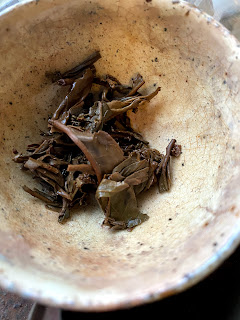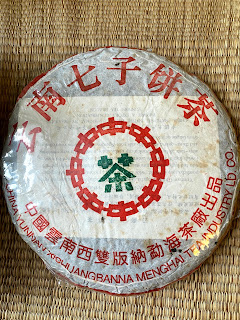This 2001 Menghai Factory 7542 “simplified yun” or “simplified characters” is quite a famous puerh known for a powerful 7542 character beyond others in the few years before and after. In the west it was Houde that introduced this special 2001 7542 to many when they sold a version of it years ago. Much has been written about this famous 2001 Simplified Yun 7542 and the price on this cake is now in the thousands of dollars. Interestingly, although trying 7542 from the 80s, 90s, and early 2000s, I cannot recall sampling this one although it was entirely possible. The last few years I have quietly agonized about doing a deep dive and extensive sampling of 7542. I decided that I will stock up on some but was unsure if I wanted to commit to a time consuming and expensive (but probably super enjoyable) sampling to find the best or at least the best value. These days my moto is to leave the dirty work to others. Hahaha.... I was also on the fence on whether I wanted to go in for some really famous (and likely overpriced) or aged 7542 or some young cheaper medium aged stuff. I seemed to regularly stare at the famous 2009 Menghai Factory 7542 (901) “Blue Diamond” at the Jade Leaf but having tried it before just find it too expensive for 10year 7542. This is the curse of such a famous recipe. My indecisiveness has led me down this path which I seem to be happy with...
When the opportunity to jump on a nicely Traditional Hong Kong stored cake from Teas We Like ($650.00 for 357g cake) presented itself this year. I jumped on the chance. It sold out in lightspeed. But was the pricy decision worth it?...
The greyish looking dry leaves smell of musty old wood.
The first infusion has a rich woody deep almost cherry taste
which is very condensed and pure. It is surprisingly
shocking to me that there is absolutely no dirt taste at all! It defies all that I know about Hongkong
Traditional storage and completely leaves me dumbfounded! It is very smooth in the mouth with no
throatfeeling really and is very oily feeling.
There is a lingering sweet oily taste.
This is going to be a truly amazing and rare puerh experience I think…
The second infusion has a strong clear and pure camphor
woody that has an almost faint sweet oily woody almost not that sweet molasses taste. The Qi is strong in the mind with a very
strong focusing mind and body alerting expansive awareness and sense sharpening
Qi. It has a nice warming feel. The oily almost orange wood taste is trapped
in an oily saliva gob in the throat after that releases and oily woody almost
faint mint taste. Qi is very strong but
no harshness or edge what so ever.

The third infusion has a thick syrupy woody almost camphor
taste with an oily mouthfeeling. The
upper-mid throat hold a gob of oily saliva and tastes of oily woody almost
mint. There is a very subtle hard to
explain sweetness that is almost like unsweetened woody molasses if you could
imagine it. The Qi is superpower to the
extreme strong factory Qi that you would expect but then some!
The fourth infusion is thick oily but has a pure syrupy
elegance to it. No dirt or dank at all
100% no storage taste which would most definitely have me thinking this is not
HK traditional at all. Its really mind
blowing to me… there is a woody oily saliva balling with a fresh almost minty
woody hold in the throat with a barely sweetness to it no bitterness or
astringency so is very smooth.
The fifth infusion has a woodier and less syrup thickness or
oiliness to it. More dark wood rich
smooth taste. The mouthfeeling and
throatfeeling are less oily and saliva grabbing as well now. Qi is still strong.
The sixth infusion is a bit oilier with an oily woody with a
fresh breath of mild sort of minty camphor with a long not sweet oily molasses
aftertaste with notes of slight sort of sweet bread in the aftertaste. Qi is strong and focusing now.
The seventh infusion has a rich woody a bit less oily with
some faint fresh camphor breath. Its
really smooth and the Qi becomes a strong focusing energy. This puerh has no bitterness, astringency, or
harshness left in it and pretty much sums up/ is a reference cake as to what
Hongkong Traditional storage is capable of.
The eighth infusion has a woody less oily taste with less
underlying sweetness over the last few infusions and less oily mouth and
throat. It has a bit of faint dry or
gripping but almost unnoticeable now.
The Qi is warming and focusing now and almost makes me feel drowsy but
focused.
The ninth has a bit of woody underneath syrup sweetness to
it again with a bit more oily texture.
This infusion tastes woodier than the previous the mouthfeel is a bit
more oily but still that faint gripping dryness is there. Less of an aftertaste now more dry in the
aftertaste and at the top throat.
10th has an almost nutty woodiness now. The nutty taste is a common sign of Traditional
Hongkong storage for me. There is also
much more woody camphor now with a pungent coolness. This is a really tasty classic Traditional
Stored Menghai Factory taste in this infusion.
The woody aftertaste is longer in the mouth here too. Warming Qi focused and energized alerting
mind with slight drowsiness.
11th has a camphor woody profile now with a more
slight puckering tonguefeeling and upper throat. Less oily texture but more engaging mouthfeeling
overall. Not too much aftertastes. Focusing Qi.
The 12th and 13th have a nutty camphor
woody profile with some camphor and a mild puckering mouthfeeling an still mild
oily texture. There is a stronger woody
camphor finish. When the nutty taste is
stronger and present it seems the camphor finish is more pronounced and
long. Focusing Qi.
14th oops I left this in the pot for about a
minute… the result is really nice thick nutty syrupy rich woody infusion with
camphor finish. Tastes like some of the
thick and syrupy almost subte sweet infusions of the early session mixed with
the more camphor woodiness of the late infusions. I will continue these minute long
steeps. This puerh also has good stamina
for a traditional stored Menghai Factory 7542.
15th is steeped for a few minutes it gives off
slightly nutty and more obvious thick syrupy woodiness and camphor with an oily
texture and slight puckering mouthfeeling.
The slight puckering mouthfeeling here interestingly is very similar to
the famous 90s Menghai Factory Qing Bing which is dry stored but also know for
its power and strength. The sensation is
actually very similar despite the difference in years and storage… afterall
they are both know to be powerful production years and both the classic 7542
recipe. It’s interesting though… The
long steeps are pushing out a rush of alerting Qi power as well!
16th this is a good 5 minute infusion…

It pushes out delicious nutty deep rich taste that has a bit
of sweetness hidden in there. I steep it
like this for a few more days…

Vs. 2001 Mengku Mengsa Thick Paper (spent leaves on the right) The 2001 Menghai Tea Factory 7542 Simplified
Yun has much better stamina and a deeper more complex and powerful taste than
the 2001 Mengku Mengsa Thick Paper which has the typical dirt taste but also
very long lighter aftertastes in the early infusions. The tropical tastes and floral mouth with
some Traditional Storage make the 2001 Mengku Mengsa interesting but not nearly
as good as the Simplified Yun. The Simplified
Yun has shockingly no dirt taste at all.
I have never tried a traditionally stored cake that had no dirt
taste. I know I go on about how I love
the dirt tasting puerhs… but what if no dirt??? It comes out very nice indeed! This is by far the best Traditional Hongkong
stored puerh I’ve tired.
Peace

















